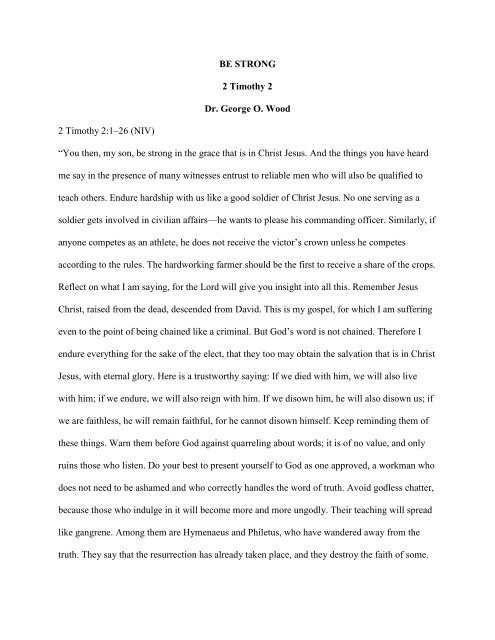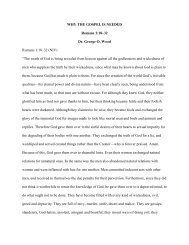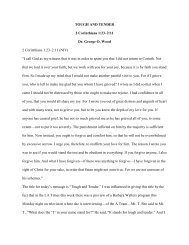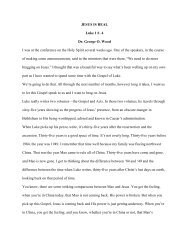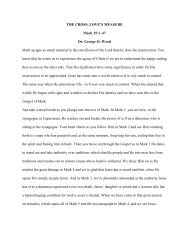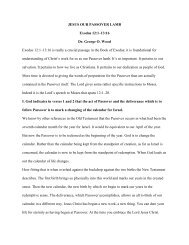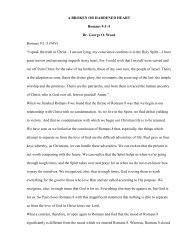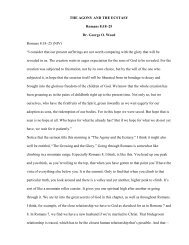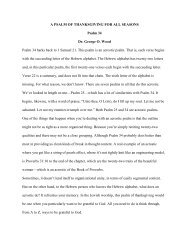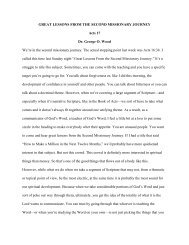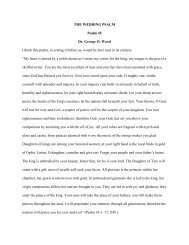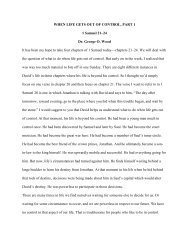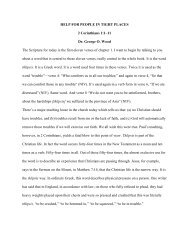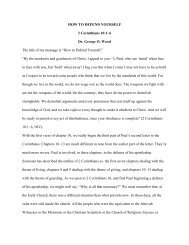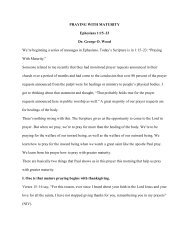10 BE STRONG.pdf - Dr. George O. Wood
10 BE STRONG.pdf - Dr. George O. Wood
10 BE STRONG.pdf - Dr. George O. Wood
Create successful ePaper yourself
Turn your PDF publications into a flip-book with our unique Google optimized e-Paper software.
<strong>BE</strong> <strong>STRONG</strong>2 Timothy 2It is therefore somewhat not surprising to find that members of that second generation were notas alert to come to Paul‘s aid and defense because of fear on their part. The transmission of thefaith is Paul‘s concern in the first two verses—if one generation is taken out of the Christianchurch, if one generation fails to pass it on, then the gospel suffers incalculable loss. One onlyhas to read church history to see that when one generation failed in its task, a thousand years ofdark ages may have come. The faith must be passed on. Paul says in these first two verses thatwe receive the Christian faith as a result of hearing among witnesses. We come to believebecause we‘ve heard the glorious message, which is true. But we also come to believe because inthe hearing of the message we are surrounded by witnesses who have not only themselves heardbut who have experienced what is being talked of in their own lives. So the witness of the gospelis confirmed in the lives of those who hear it.Paul is seeing the need for transmitting this faith to another age should Jesus tarry. Will thechurch grow in the second and third generations, which are coming? The position of leadership isall-important. So Timothy is told by Paul, ―Get good leaders. Get men who are faithful to leadand get men who are apt to teach.‖Why the emphasis on faithfulness? Because in the midst of persecution some were provingunfaithful. And because in the midst of doctrinal and heretical controversy within the churchsome were giving sway to various heresies. There needed to be faithful persons.It is a fascinating thing to see that in the darkest hours of the church‘s persecution the church isalso most deeply tested in its inner nature with false teachers which emerge. It seems as if thegreater the pressure is on the outside, the greater the pressure is on the inside of the church. Sothe double threat breaks out simultaneously. Pressure from without and pressure from within.3
<strong>BE</strong> <strong>STRONG</strong>2 Timothy 2Therefore the man of God, the person of God, whether he be leader or not, is faithful and apt toteach.The transmission of the Christian faith must be a living thing. It must be living in the life of theone who transmits it. This ―apt to teach‖ is a scary thing to anyone who stands behind the pulpitor teaches others. There‘s no fate worse than the fate of boredom. ―Help me not to be a bore,‖ isthe prayer I pray!II. Lay hold of godly motivations.Paul, when he is done with these first two verses in speaking of the transmission of the Christianfaith, goes on to speak of the motivations which are now necessary for Timothy to lay hold of.Timothy in his motivation is to remember that he is to take his share of suffering as a goodsoldier of Jesus Christ. In fact there are three illustrations that are used very rapidly in verses3,4,5, and 6. Encouragement is needed for Timothy, and there is suffering that is beingexperienced both by himself and perhaps by the members of the church that he pastors. Paulhimself has gone through suffering. But the Christian always remembers as he goes throughsuffering and difficulty that, even if life should come to an end in that period of suffering, life isonly closed in the ninth inning. And Jesus Christ will always come to bat last. And the winningrun is always in the bottom of the ninth. It‘s the Christian way of approaching suffering. Youknow because of the resurrection of Jesus Christ who‘s going to win the game. Paul, time andagain in these illustrations related to the soldier and the athlete and the farmer, says in the endthere‘s victory.Some years ago I read a book which left an indelible illustration on my mind. It was by OscarCullmann called Christ in Time. He tackled the question of how is it, as believers, we can saythat Christ has won a victory for us when all around still we see death and suffering? The answer4
<strong>BE</strong> <strong>STRONG</strong>2 Timothy 2so beautifully came in the way of an illustration. In any given war there is a turning point whichcomes at some time in the war. The war may not be over for months, for years. But when thearmistice is later signed persons can look back and say, ―What changed the course of the war?‖And they can say, ―That battle changed the course of the war.‖ In effect, the war has beenalready won because that battle has been fought. What remains is the mopping up operation.That‘s how we look at the Cross and the Resurrection. There‘s a war that still goes on, butthere‘s never a doubt of the outcome. The key battle has been fought. Christ has triumphed overdeath. There‘s victory. Paul therefore with confidence can turn to these analogies of the soldierwho is marked by obedience, by sacrifice and by loyalty. By the athlete who is marked by selfdenialand self-discipline. In fact it‘s fascinating to look at verse 5 and see that an athlete is notcrowned unless he competes according to the rules. In the Greek games there were two kinds ofathletes—the pro and the amateur. The pro athlete is one who underwent a strict trainingregimen. For certain races and particular kinds of contests he had to affirm before the race or thecontest began that he had undergone and faithfully obeyed all the rules of the training period. Astandard rule for a race was a ten-month training period, where strict rules were laid down. Therunner could not run unless he had already kept those rules; he was disqualified.Paul is saying this analogy applies to the Christian life. There is a race to be run, disciplinespiritually to be kept.Then Paul refers to the farmer.When Paul is finished giving these three illustrations he says to Timothy, ―Think over what Isay‖ (verse 7). Keep in your mind these illustrations, mull them over. The Holy Spirit is going togive you understanding.5
<strong>BE</strong> <strong>STRONG</strong>2 Timothy 2What understanding comes from these? I believe this. The soldier is upheld by the thought offinal victory. He can survive through the darkest days because he‘s training for a cause that hehopes he‘ll win. The athlete is upheld through the months of discipline and training. By thethought of the laurel wreath, the crown which comes that says he‘s won the race. The farmer isupheld through the long months when he has to sit and wonder if his crop will appear. Thefarmer is upheld with the thought of the harvest.For the Christian, hope is never a wish. Hope is always a certainty. We hope in Jesus Christ, notwe wish.There‘s motivation for Timothy not only in these illustrations of the soldier, the athlete and thefarmer. But there‘s motivation by constantly remembering Jesus Christ. Paul says in verse 8,―Remember Jesus Christ.‖ The verb is in the present tense, meaning ―Go on remembering.‖Make it your daily occupation. ―Remember Jesus Christ risen from the dead.‖ Risen, not simplyin the sense of have having risen a long time ago. But risen and who continues raised. Risen andalive. Remember Jesus Christ the living One. Remember also His humanity, descended fromDavid, that in His hour He also had trials. It is the belief and knowledge of the risen Lordsustained in these times of difficulties.Paul also is motivating Timothy, reminding him of Paul‘s association with the gospel. Paul notesin verse 9 that nothing can bind the Word of God although he, Paul, himself is fettered as acriminal. There are only two times in the New Testament where that word ―criminal‖ or―malefactor‖ is used. It‘s used in Luke 23 to describe the two thieves that hung on either side ofJesus, who were known for their gross crimes, their thievery and murder. Now Paul says it‘sapplied to himself. A criminal.6
<strong>BE</strong> <strong>STRONG</strong>2 Timothy 2What he means by that, it‘s interesting to try to guess. One guess, because of the fire in Rome in64 A.D., Nero blamed the Christians for the fire. It would be natural that he would try to seek outthe leaders of the Christian community, like the apostle Paul. So perhaps Paul is in prison underthe charge of arson or inciting arson. Therefore a criminal of the worse sort.Or maybe that term is simply applied to him because he is in a place where there are otherpersons of that rank. Nevertheless Paul says the Word of God can‘t be bound. By that Word,Paul prophetically speaks of the course of the gospel in every age. Men may be bound, but theWord is free, the Spirit of God is free.III. Look to the future with confidence.Paul is very confidently able to look to the future, in verses 11–13, with a poem or hymn—―If wehave died with Him, we‘ll live with Him. If we endure, we shall reign with Him.‖ But if thepositive is true, so is the reverse. ―If we deny Him [as Judas denied—not as Peter who denied onthe spur of the moment—but as Judas, who denied premeditatedly, calculatingly]… If we denyHim, He will deny us.‖ Lest anyone be tempted to deny the Lord in that fashion, Paul must saythe Lord is faithful to His word. Even though men may be faithless, the Lord is faithful. Mark 8,Matthew <strong>10</strong> said ―He who denies me before men, I will deny before the Father.‖ Paul is sayingJesus cannot deny that statement. He said He would. Therefore at the end of the age, He must dowhat He has said. He must remain faithful to that word. Of course, this was an age when denialwas an ever-present temptation, and denial is an ever-present temptation for us in a different kindof age and a different kind of culture as well.IV. Correct false teachers.Paul then, in verses 14–26, gives a rather lengthy teaching on correcting false teachers. Falseteaching is a dominant theme of this letter and of 1 Timothy. It occurs in 1 Timothy 1 and 4 and7
<strong>BE</strong> <strong>STRONG</strong>2 Timothy 26 and now in 2 Timothy 2. Paul tells Timothy some things that he must work on positively tocorrect false teachers. For example, in verse 14, he is to remind the congregation of this—whathas preceded that statement and what is to follow. The temptation of the heretics was to comealong and say ―Here‘s something new! Don‘t the people have desire for something new?‖There‘s a natural desire for things new, which is good. Then there comes a sort of unhealthycuriosity. To combat the teachers who are always coming across with something new,Paul says new is not what‘s in order here. Remind them of things which are already known.Avoid word battles, because they can only lead to ruin. The word for ―ruin‖ is ―catastrophe.‖They will capsize your faith. But rather present yourself to God as one who has been approved,passed the test. Not needing to be ashamed, rightly handling the word of truth.That word ―rightly handling the word of truth‖ (verse 15) has been used by many Christians tosupport peculiar and unique ways of understanding Scripture. Sometimes even cutting it apart.The word ―rightly handling‖ literally means ―cut straight.‖ It was used of men who made a road.They would cut it straight. It was used of a farmer who would plow a furrow, a straight furrow. Itwas used of a stone mason who would cut stones so they would fit straightly into a building. It‘sused here of the Christian teacher to indicate that in relating the Word of God, interpreting it,proclaiming it, it must be rightly handled—cut straight. One cannot select this part and this partand ignore other things.There‘s also godless chatter, that which Paul enjoins upon Timothy and other Christians—―godless‖ meaning profane and ―chatter‖ meaning empty sounds. The criteria for a discussiongroup is this: Is what we are discussing leading us closer to God and toward one another? Or is itnot? William Barclay, in his commentary on this passage, has an eloquent thing to say about the8
<strong>BE</strong> <strong>STRONG</strong>2 Timothy 2danger of discussion. There are times when too much talk can be positively dangerous. Toomuch talk and too much discussion can have two dangerous effects.First, it may give the impression that Christianity is nothing but a collection of questions fordiscussions and problems for solutions. The discussion circle is a characteristic phenomenon ofthis image. Chesterton said, ―We have asked all the questions which can be asked. It is time westopped looking for questions and started looking for answers.‖ In any society the discussioncircle must be balanced by the action group.Second, discussion can be stimulating and invigorating for those whose approach to the Christianfaith is intellectual. But for those who have a background of knowledge and of culture, for thosewho are characteristically students, for those who have a real knowledge of or interest intheology, it sometimes happens that a person who has not had this background finds himself in agroup which is tossing heresies about and propounding unanswerable questions. It may well bethat the faith of that person, far from being helped, is upset. It may well be this is what Paulmeans when he says that word battles can undo those who listen to them.The normal word which is used for building a person up in the Christian faith, or ―edification,‖ isthe same word that is used literally for building a house. The word which Paul uses here for―ruin‖ is the word which might well be used for the demolition of a house. It may well happenthat clever, subtle, speculative, destructive, intellectually reckless discussion may have the effectof demolishing and not building up the faith of some person who happens to become involved init. In all things there is a time to discuss and a time for silence.This godless chatter can have inroads into the Christian community, so much so that Paul saidthat some were even advocating that the resurrection is past already. These are the firsttheological liberals. Resurrection is past already. In other words, what their doctrine involved9
<strong>BE</strong> <strong>STRONG</strong>2 Timothy 2the right kind of vessel. You have a choice of the vessel. In the great house there are both vesselsmeaning the gold and silver.V. Be an example to the believers.Then, in a series of closing admonitions in the second chapter, Paul indicates to Timothy thingshe must do as a personal example. There is nothing more powerful in counteracting the falseteachers than the personal life that is modeled or displayed by Timothy himself. He is to shunyouthful passions. Passions here means to stay away not only from sexual temptations. But itmeans to stay away from the particular kinds of temptations that are incumbent on youngerpeople. Like impatience, a spirit of criticism, etc.Aim at righteousness, faith, love and peace. Avoid stupid and senseless quarrels, controversies.Practice kindness, be able in teaching, forbearance, correcting your opponents with gentleness.Why all this concern about correcting your opponents with gentleness? It‘s because the aim ofthose who witness to someone who‘s involved in false teaching is not to win an argument but towin a person. Therefore the manner in which the truth is presented must be kindly.Have you ever been witnessing to someone whose views were so diametrically opposite fromyours that you got so inwardly mad that you wanted to win the argument? Wipe him out. Howeasy it is to win a case and lose the main thing we‘re after.As we kind of overview this second chapter, certain things come to my mind. Has the Holy Spiritthrough this passage of Scripture today brought into your heart conviction regarding some thingsyou may have neglected to do or some things you have done which are wrong? Always we askthat in reading Scripture because it‘s a purifying element in my life.Has the Holy Spirit brought to your awareness any spiritual needs in your life today which needto be made right?11
<strong>BE</strong> <strong>STRONG</strong>2 Timothy 2On your own, this would be an exciting extension of this time together. You can go through thispassage of Scripture and ask what qualities of life revealed in this chapter does the Lord want meto have? This chapter is a beautiful chapter describing the character of the Christian believer.What qualities are there that the Lord wants me to have?And finally, what personal encouragement is there for me in this chapter? The overridingpurpose of this letter is to provide not only correction and counsel for Timothy, but provideencouragement as well. So what encouragement is there?I take great encouragement in the statement, ―Remember Jesus Christ risen from the dead‖ (2Timothy 2:8). Remembering that He is the living One. And to put that together with, not onlydoes Jesus Christ live, but we shall live with Him.As Christians, there is a healthy and holy exercise of imagination that we can practice. We alldaydream. There must be a positive way to manage our daydreams. Control them so they don‘tcontrol us. Next time you‘re imagining, paint a picture of what it‘s like to live with the Lord.Imagine it. Make it relationship in your heart. Jesus lives, and I shall live with Him. That‘s whatPaul is telling Timothy to do. Remind yourself of this. Keep on thinking about it. That you mightbe built up in your faith, encouraged.Closing PrayerLord, in these moments we bring ourselves to You once more in this service, thankful for whatwe‘ve experienced in this hour together, the wonder of hearing from You. The wonder of beingpart of a company that stretches through the length of time, back down the centuries, living faithin the Lord Jesus Christ himself. The glory of being in the family of God. All the wonder that isours in being there. I especially ask, Lord Jesus, there are those who are in this service todaywho‘ve not yet opened their lives to You or come into Your family. That there would even now12
<strong>BE</strong> <strong>STRONG</strong>2 Timothy 2be a cry from their own hearts of prayer, ―Jesus, I confess You. Jesus, I confess my sins. I openmy life to You.‖ Lord, we pray that the graces, the qualities that are being sought for by You inus shall come to pass. That our walk and our talk will be marked by love and gentleness,kindness, faith, purity and in all things we might please You. You who suffered for our sins, whobore stripes on our behalf. We praise You today. Through Christ our Lord. Amen.13


